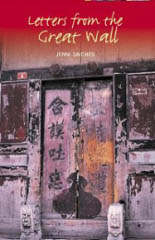Letters from the Great Wall
‘Killing the Angel in the House…’
 As a critic, historian and biographer (writing her non-fiction as Jenni Calder), Jenni Daiches is well known for her perceptive literary and historical analyses, and for her highly acclaimed life studies of writers, most notably of Naomi Mitchison and RLS. As Jenni Daiches, she is also an established poet; and now with the publication of Letters from the Great Wall, she makes her long overdue debut as a novelist.
As a critic, historian and biographer (writing her non-fiction as Jenni Calder), Jenni Daiches is well known for her perceptive literary and historical analyses, and for her highly acclaimed life studies of writers, most notably of Naomi Mitchison and RLS. As Jenni Daiches, she is also an established poet; and now with the publication of Letters from the Great Wall, she makes her long overdue debut as a novelist.
For a first novel, Letters from the Great Wall is neither tentative nor unaccomplished. It is a carefully constructed first-person narrative, taking the form of journal entries or a series of letters; ‘writing breaks the silence, and I am trying to speak through my pen on paper as best I can.’ In writing her experience, the narrator is writing a letter to the world, a letter to those who will care to read it. Letters from the Great Wall is a study in how one young woman finds the courage to liberate herself from the constraints placed upon her by family and society. The surprise is that the story takes place not in the early years of the nineteenth century, but in the last few years of the twentieth. And in many respects, Eleanor’s story can be said to be not greatly different from the stories of many women today, whose predicaments are, mutatis mutandis, depressingly similar. Though by the point where Eleanor breaks off her writing, she has already won a kind of freedom.
It is 1989. At thirty-three and still young, Eleanor Dickinson teaches English literature at Edinburgh University. A product of the Scottish educational system herself, she has had to work harder than any of her male contemporaries to be where she is. Her early background is like the ‘Janet and John’ books: father goes to work every day; mother keeps house; John makes boys’ toys with his chums; Janet contents herself with her doll’s house until she grows up and can have a real husband, a real home and two real children. A first-class honours degree; a promising university career; a partner Roy and a joint mortgage: it looks as if everything is rosy for Eleanor. Next will come the big wedding, and the two children to complete the happy ending, her family’s expectations dutifully met and society’s norms satisfied. Except, for Eleanor this will not do. This will not do. ‘All my life’s been making things unnecessarily complicated, agonising over decisions, should I apply for that job, make love to that man, fail that student, confront parents, boss. Should I speak or stay silent? Should I flee or attack?’ She decides to flee, giving up job and house and partner in Edinburgh to travel to China.
This flight however should not be equated with a simple running away, for it also represents a running towards something, a new country and the promise of a new life, a liberation. Once in China, Eleanor has the freedom, the opportunity, and the vast physical and emotional space to explore her old life and her old motivations. Her flight takes on the beginnings of an epic in her mind, for ‘the great epics are all about compulsion, about obeying some external fate, interior dharma, whatever. This compulsion is you, part of your heartbeat and the rhythm of your consciousness – and conscience.’ In describing her flight and the underlying reasons for it, Eleanor is in fact giving herself the means to make an attack on those stifling institutions and oppressive conventions that, paradoxically, have set her free.
Letters from the Great Wall is intense and full of surprises. It is a book of contrasts and parallels. From a relatively free, open and democratic West, Eleanor has come to ‘the mysterious and threatening East, where I had no business to be.’ On this voyage of discovery, Eleanor learns that in Scotland she had been in ‘the wrong story’ and now on her momentous train journey across China she is ‘becoming aware of a different one, meandering, slow, inconsequential … which carries my old story and allows me to glimpse … without much comprehension, the stories of others.’ Except the ‘meandering, slow, inconsequential’ story, perhaps a description of some of China’s history, is to culminate in the massacre at Tiananmen Square, where Eleanor will find herself bound into part of history and fate.
If Letters from the Great Wall is to be described as a long meditation on one young woman’s life, this description fits only in part: meditation implies a withdrawing, an interiorising of one’s world, and is a mental and not a physical process. What Eleanor is doing here is living her story, telling it as it unfolds. Daiches’ writing is poised and elegant. The descriptive passages charting the narrator’s journeys though China are imbued with a sensibility that shows the poet Daiches equally adept as novelist.

AMAZON_SIDEBAR_TEXT <1905222513> <Buy Letters from the Great Wall>
Jenni Daiches. Letters from the Great Wall. Luath. 1905222513. £9.99.
© Michael Lister 2006

Comments